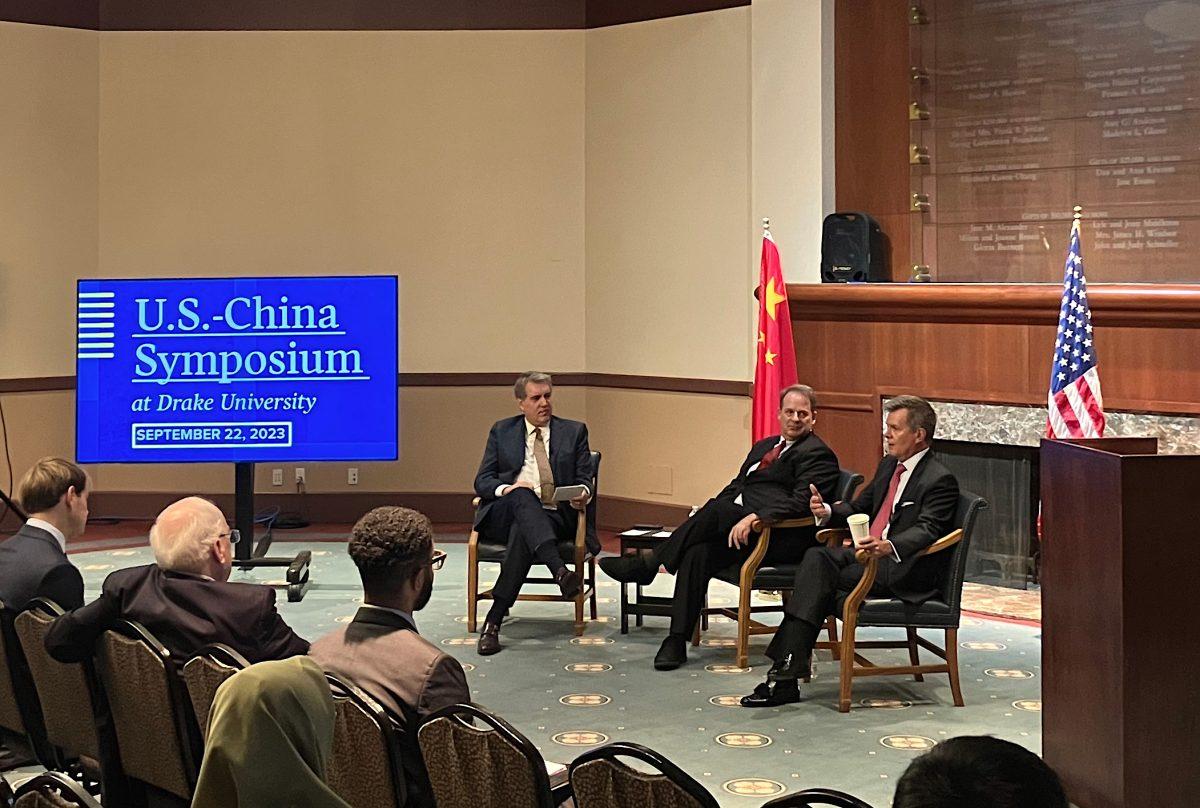Last weekend, Drake hosted international leaders and experts in United States-China relations to discuss trade and China’s economy.
The discussion marked the second annual U.S.-China Symposium hosted by former U.S. Ambassador to China and current Ambassador-in-Residence Terry Branstad in conjunction with the Global Engagement Office. In his opening remarks, President Marty Martin said the event, which was free and open to the public, facilitates responsible global citizenship.
“Special events like this provide us with an opportunity to deliver on Drake’s mission promise of preparing responsible global citizens by highlighting important international topics and bringing expert global practitioners to our campus,” said Hannah Sappenfield, the assistant director o f global partnerships in the Global Engagement Office. “We can bring the world to Drake, so to speak.”
To encourage open discussion amid high tensions between the U.S. and China, the symposium was delivered in accordance with the Chatham House Rule, under which participants agree to let attendees use discussion content as long as they do not reveal who made a particular comment. Attendees were also encouraged to turn off any recording devices at multiple points during the symposium.
“Some comments made could have caused irritation if they were on the record,” said first-year student and attendee Mitch Davis.
Davis asked multiple questions during the symposium, one of which concerned the arbitrary detention of foreigners in China. In an interview following the event, Davis said the question was prompted by his near-detainment in Tiananmen Square — the site of a massacre that was estimated to have killed hundreds to thousands of protestors, mostly students, calling for democracy, free speech and a free press in China.
The Chinese Communist Party — the all-ruling party in China — has worked to erase the event from the nation’s history, stripping it from textbooks and censoring online discussion on the matter.
“I was a foreigner with a camera, and it was June. The massacre was June 4, 1989, so they get really nervous in the month of June,” Davis said.
Davis traveled with a friend whose family resided in China. After questioning, a lengthy Chinese-language conversation with Davis’ friend and looking through Davis’ camera roll and messages, the police officer let him go. When asked if he would return to China, Davis said “absolutely not.”
“Arbitrary detention is a real problem,” a speaker said in response to Davis’s question. However, the speaker said the Chinese government is more likely to take non-figureheads to avoid “negative externalities,” so students and CEOs don’t need to worry. Other speakers encouraged students to go to China to learn about the world’s second-largest — and possibly soon-to-be largest — economy.
Multiple speakers urged the audience not to count out China’s economy, despite the CCP’s focus on national security at the cost of economic growth. They also said China adapts technology “far” faster than the U.S. and claimed Chinese businesses have an “unkillable entrepreneurial spirit.” Some participants said China’s economy could eventually outpace that of the U.S. despite the government’s neglect of economic growth.
Multiple participants spoke on the importance of viewing China with nuance. China’s economy has struggled to rebound after the pandemic, but participants said the country’s commitment to renewable energy is promising, as is American businesses’ desire to continue cooperating with the Chinese government.
Nuance should also be applied to China’s governance, participants said. Despite the CCP’s desire to implement “Xi Jinping thought” — a political ideology distinguished by Communist ideals, an emphasis on the one country two systems policy and absolute authority of the CCP over the people—throughout the country, local governments still find ways to “subvert” policies. While it’s easy for Americans to think of China as a “monolithic entity,” China possesses great linguistic and cultural diversity.
Even Taiwan, an island China claims as its own territory, must be viewed with nuance. In response to an audience question regarding Taiwan, a speaker said “China doesn’t want to start a war they can’t win.” The speaker also referenced the CCP’s ability to learn from the actions of other countries’ leaders — in this case, Putin’s shortcomings in Russia’s war on Ukraine.
Taiwan and human rights abuses — particularly China’s repression of the Uyghur predominantly Muslim minority — have been paramount in the Biden administration’s conversations with China. When asked whether the “genocide” of the Uyghur minority had “just been accepted by the international community,” a speaker discussed the Uyghur Forced Labor Prevention Act.
“I think there’s a tendency to normalize, like ‘oh, we’re just not going to talk about that’ with a lot of the things the CCP does,” Davis said. “That doesn’t sit well with me, but I understand why — for diplomatic reasons, for trade reasons — it might be necessary.”
Speakers attempted to address the billion dollar question in U.S.-China relations: Will relations improve, and if so, how or why? One said he sees a “possibility of slight improvement,” and others expressed their hope for a better relationship.
When asked what advice they would give to Xi, speakers advised China to double down on “people-to-people” activities like student exchanges, focus on economic growth and be “more self-reflective” about why other countries have hardened towards China.








